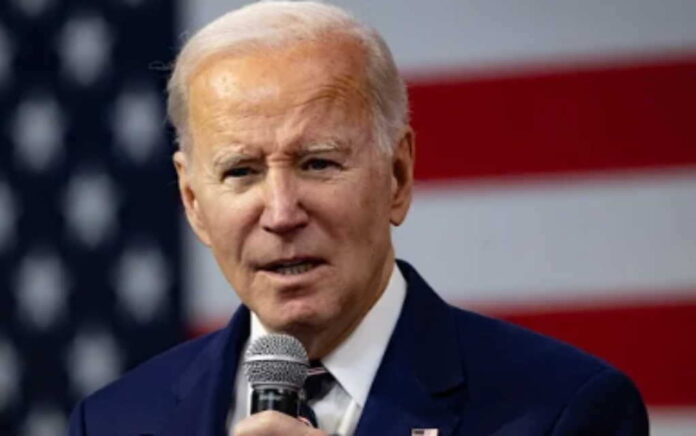
Biden’s administration is unraveling day by day. He’s hanging on by a thread.
And a Federal court just delivered Joe Biden a massive loss.
President Joe Biden’s deputies have decided not to appeal a federal judge’s decision that kills their unprecedented “parole pathway” for a huge population of economic migrants.
Andrew Arthur, a former immigration judge who now works at the Center for Immigration Studies, says that the decision is probably a bet that the Supreme Court will overturn the March 8 decision by Florida district court judge T. Ken Wetherell.
“We need to see how it plays out,” Andrew told Breitbart News, adding:
Keep in mind Texas vs United States is pending before the Supreme Court. If the Supreme Court says you can’t vacate an action under Title II, then this [Wetherell] decision goes away anyway. This is a “vacatur,” and [Wetherell] says “Look, I understand that this is an open question, [and] the Supreme Court is going to decide [it], and this will change my order if they decide I can’t issue a vacatur.”
The United States vs. Texas case is scheduled to be decided by the Supreme Court before the end of July. The case concerns judges’ authority to intervene when administrations claim they are unable to enforce a law.
The ruling is a major victory for Florida Gov. Ron DeSantis and Florida Attorney General Ashley Moody, who contended that Biden’s catch-and-release policy violates federal law and harms the state economically.
The Miami Herald reported on the White House’s decision not to appeal Wetherell’s judgment:
Biden administration has declined to appeal a decision from last week that blocks a key Department of Homeland Security program that has helped the agency relieve migrant congestion at the U.S. southern border
Wetherell said in his March 8 judgment that Biden and his deputies had converted Americans’ border:
…[into] little more than a speedbump for aliens flooding into the country by prioritizing “alternatives to detention” [ATD] over actual detention and by releasing more than a million aliens into the country—on “parole” or pursuant to the exercise of “prosecutorial discretion” under a wholly inapplicable statute—without even initiating removal proceedings.</blockquote.
The "parole+ATD" ruling demolishes fundamental pillars of Biden's pro-migration border policy, exposing migration issues that Biden hoped to conceal in the 2024 race. Among the self-inflicted problems is Biden's anticipated removal of the Title 42 border barrier in May.
Biden's plans are being utilized to address four political issues raised by his campaign commitment to repeal President Donald Trump's border restrictions.
Biden's progressive, pro-migration border commander, Alejandro Mayorkas, is dangling the "Parole+ATD" quasi-legal paths to redirect the torrent of Biden migrants in Mexico away from the chaotic cartel-run routes. This detour is meant to keep the border crowds off the evening news during the 2024 election.
Mayorkas is also attempting to assist the Democrats' business side, which anticipates many more migrant workers, tenants, and customers than the roughly one million per year threshold permitted by Congress in 1990. On March 7, he told CNN:
We need immigration … I’ve engaged extensively with the business community. There are 10 million open jobs. There’s a [business] clamoring for individuals to fill them.
The paths are also a political gift to the Democrats’ progressive wing, which claims that their “equity” agenda means foreigners have the same entitlement to work and homes as Americans.
The strategy is also used to open up new opportunities for Mexican migrant workers. This offer gives Mexico’s government an incentive to put a stop to the cartel’s disorderly delivery of migrants to the US border. If the United States is unable to operate the Mexican parole channel, Biden’s aides will have fewer levers to push Mexico to assist in concealing the large parole flow.
The judge rejected the “Parole+ATD” option, which was meant to welcome at least 240,000 migrants who transit into Mexico each year.
Mayorkas, on the other hand, established a second parole option in January to admit approximately 360,000 extra migrants per year flown in from four large nations.
Mayorkas told CNN on March 7 that in January, “we created [parole] pathways for [360,000] individuals [annually] from Cuba, Haiti, Nicaragua, and Venezuela” to come to the United States. He went on to say:
The population of those countries, the individuals coming from those countries, whom we encounter at our southern border has dropped more than 95 percent [because of the safer and cheaper parole pathway].
Surprisingly, that effective initiative is being challenged in court. In Texas and other places. And it baffles me why, if there is a concern about the amount of encounters, someone would attack a solution that is working so well.
A second lawsuit has been filed against the second parole pathway by Florida and 19 other states.
Judge Wetherell’s decision also targeted Biden’s expansive usage of the parole pathway, supporting the four-country parole pathway lawsuit:
The Court concludes that [Biden’s parole policy] is contrary to law in three ways: (1) it does not contemplate a return to custody once the purposes of parole have been served; (2) it does not comply with the case-by-case requirement; and (3) it does not limit parole to urgent humanitarian reasons or significant public benefit.
Altogether, the two paths would increase immigration numbers by 60% above Congress’s cap, or to almost one migrant for every two American births each year.
Economic migration from poor nations in Central America, Africa, and elsewhere is encouraged and made possible by ATD and parole laws.
They facilitate migration by assuring poor foreigners that they will be able to quickly relocate into US jobs that will pay off their obligations to criminal traffickers. Economic migration would be significantly reduced if migrants believed they would be unable to find jobs in the United States to repay their smuggling obligations.
Stay tuned to The Federalist Wire.



















